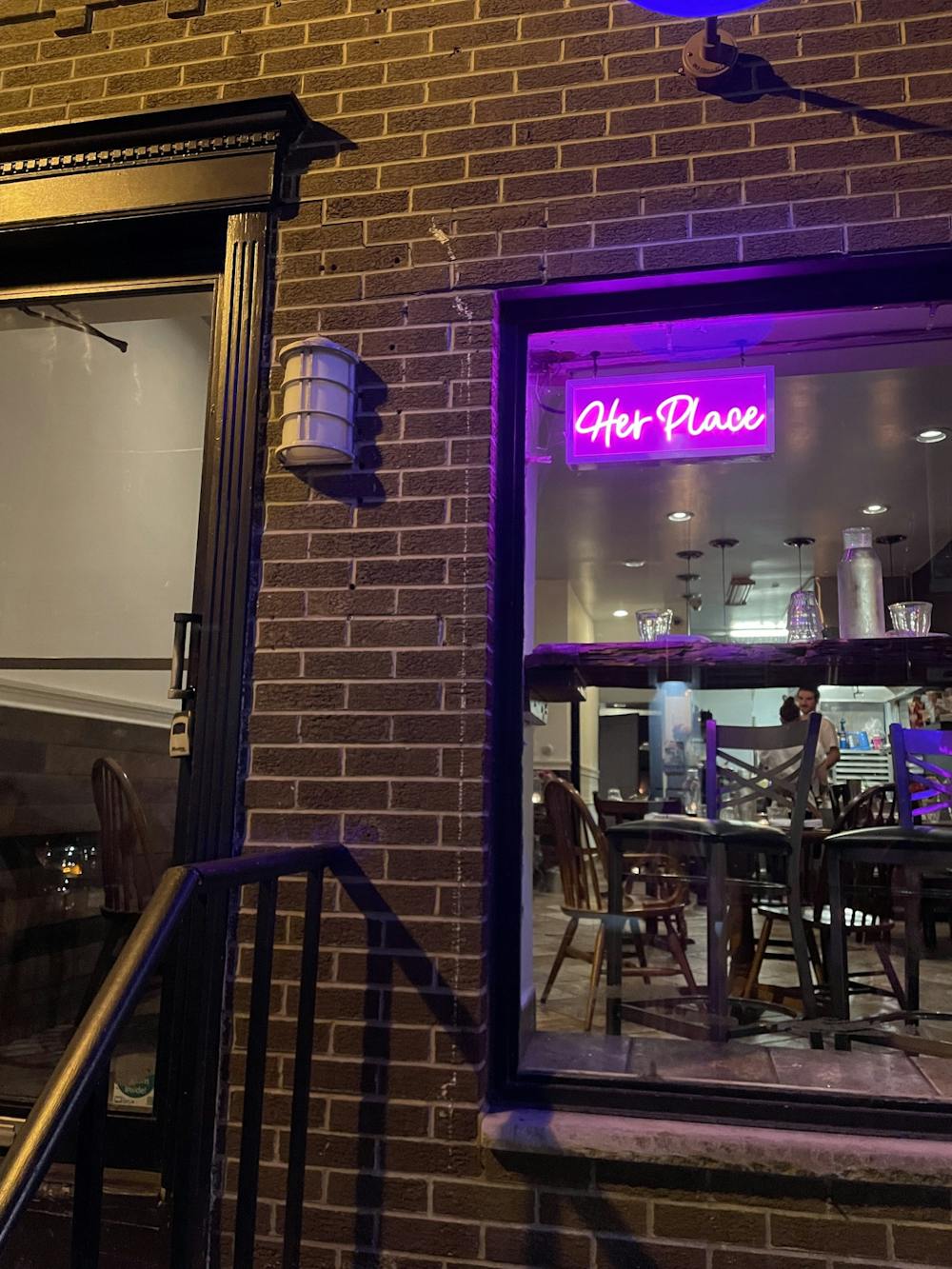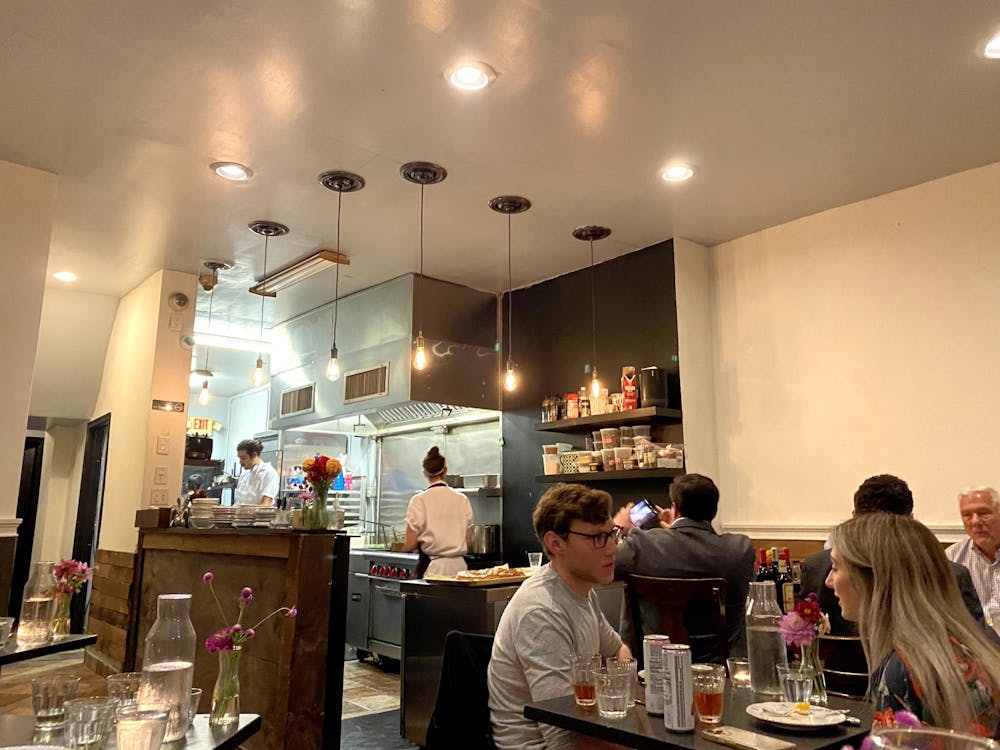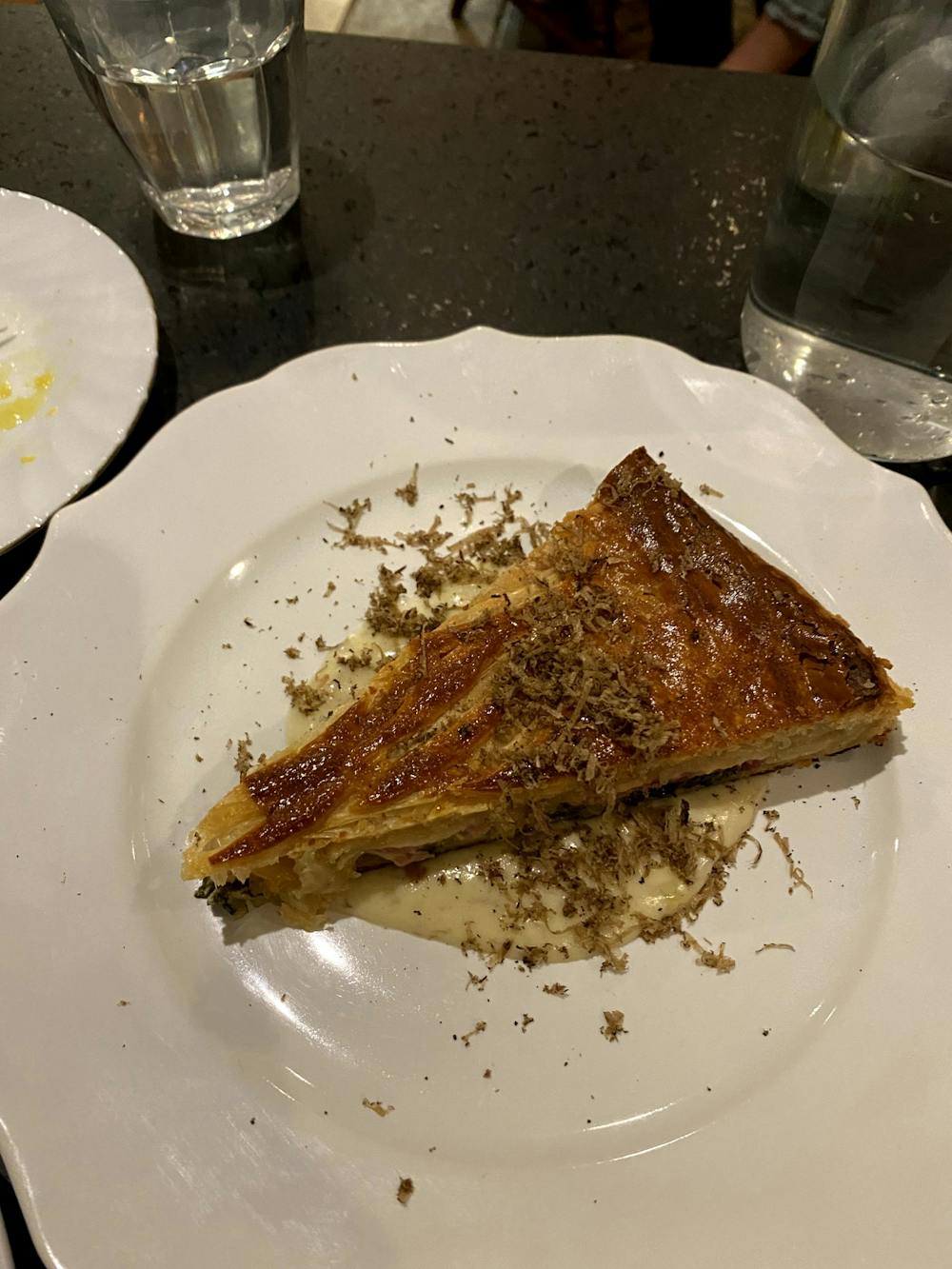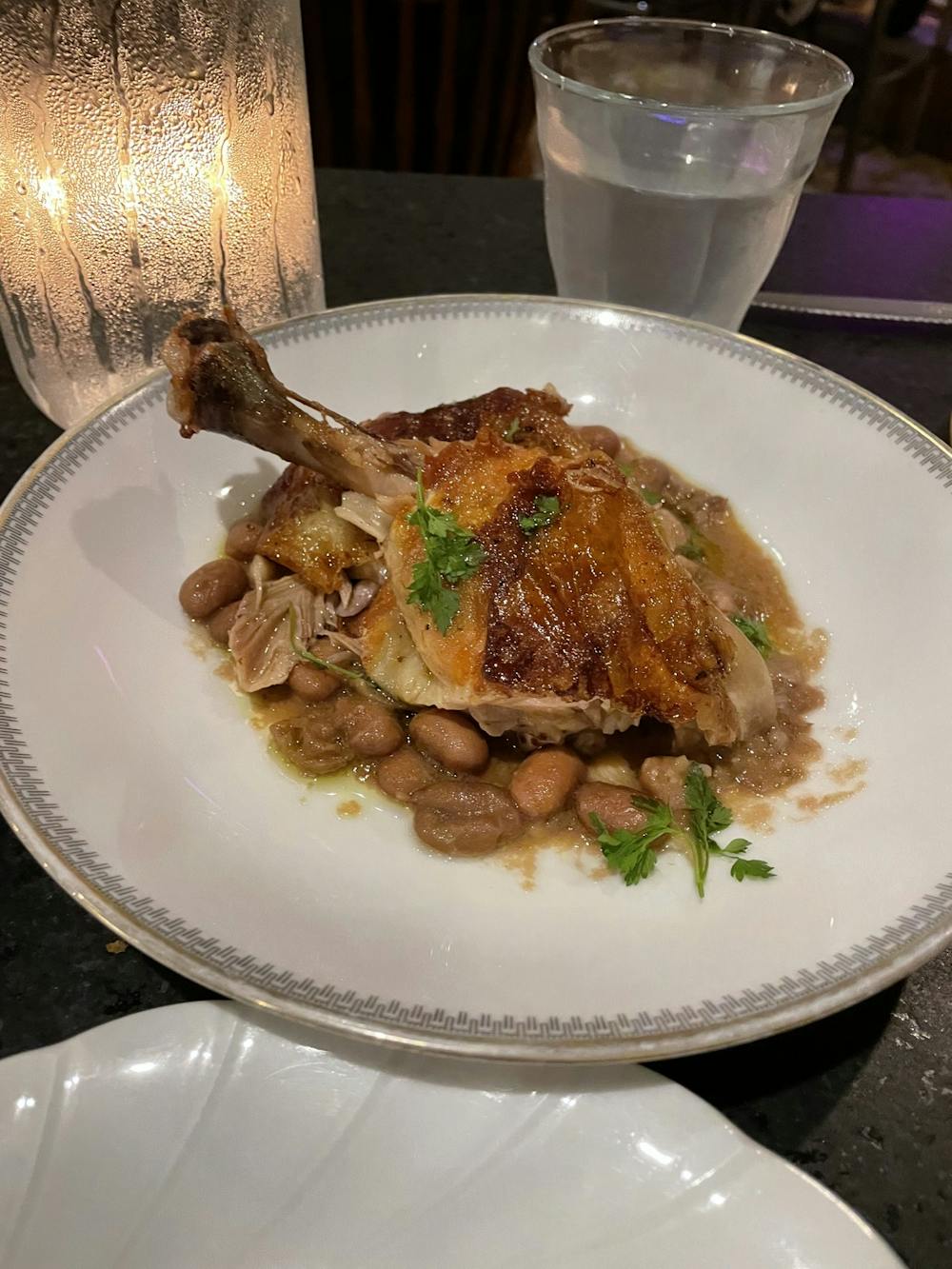Amanda Shulman (C ’15) clinks a glass with a spoon until the room gets quiet. Her curly hair sits in a loose bun on top of her head, and she sports a lovingly worn–in black apron. For a few seconds, a hush hangs in the air as diners shift in their seats to catch a glimpse of the chef.
“Hi everyone,” Shulman says after a moment, breaking the silence. “I’m Amanda.”
By all accounts, this seems like the setup to an intimate dinner party hosted by a friend, rather than a five–course meal served by a culinary star. But, therein lies the entire point.
This bespoke dining experience occurs at Her Place Supper Club, a half–dinner–party–half–restaurant tucked away on Sansom Street near Rittenhouse Square. It’s a small and unassuming space, decidedly nondescript except for the neon “Her Place” sign in the window. Inside, wooden tables are set up closely enough to create a feeling of intimacy, but not too close that it feels crowded. The kitchen is in direct view of the dining room so guests can watch all of the action. A print of Philippe Henri Noyer’s “Source Brault” stands alone as the space’s only decoration. On looks alone, Her Place undersells itself.
But Her Place isn’t about kitsch. No suit–clad waiter pulls out your chair on your way in, nor is there an extensive menu full of fruity cocktails and complicated desserts. In fact, there’s no menu at all. There’s just Shulman, her small team, and her impeccable culinary abilities.

While Her Place opened as a pop–up in June 2021, this isn’t Shulman’s first rodeo in the world of the “supper club.” As a sophomore at Penn, she started making meals in her tiny campus apartment, bringing together disparate friends to enjoy her culinary labors of love.
“[The supper clubs were] how I really got into cooking,” says Shulman. “I would go down to the Italian Market and buy cheeses or get a whole pig and carry it up.” She adds that she knew The Fresh Grocer (the now–defunct grocery store in what is currently Acme) so well that friends could call her from anywhere on campus, and she could tell them where to find an ingredient.
“I would make my Facebook status: four courses, 35 bucks, message me if you want to come,” she says. Guests didn't necessarily know each other, nor did they have any idea what they would be eating.
"They'd come with a bottle of wine," Shulman says, "and I would just cook.”

The legacy of Shulman’s college–era dinner parties comes through at Her Place. Guests gather outside the restaurant at 8:30 p.m. sharp. There are two seatings a day, Mondays through Thursdays. As I wait to enter, I can’t help but look around at the other diners. Millennial–seeming couples and friends climb out of Ubers and stroll up the block, paper bags of wine in hand.
Casualness is king here. Guests are instructed to sit anywhere they choose. After a brief greeting, Shulman explains how the night works. There are a few courses: some with one plate, some with multiple. The dishes might be the same as what was listed on Her Place’s website. But, they also might not be. While the set menu rotates roughly every two weeks, Shulman prioritizes cooking with what’s freshest, warranting some unscheduled switch–ups. She also, admittedly, gets bored and changes the menu when she feels like it. There are no substitutions. Everyone eats the same thing.
The guests’ only job: show up with an open mind and an empty stomach.
We start with cold clams topped with a pepperonata sauce. The plate is beautiful. The clams are nestled in a shallow white bowl, their bright red topping playing boldly off of the ceramic dish. My dinner date and I slurp them down in minutes. The cool, sweet peppers and fresh herbs pair perfectly with the shellfish. We’re sold.
A few minutes later, leeks in vinaigrette, a classic French dish, arrives. I’m not a huge leeks fan myself. But these ones, drenched in a mild and smooth olive oil sauce and topped with crunchy hazelnuts and fresh greens, catch me by surprise. Paired with a jammy soft–boiled egg, they’re perfect.

Shortly after the advent of her supper clubs, Shulman began “staging” (pronounced staj) at Philadelphia restaurants—industry speak for working at restaurants for free in order to gain skills. While in college, her favorite restaurant was the Roman style trattoria, Amis. One day, Shulman asked the chef if she could come stage. The management obliged.
“I went in and I peeled potatoes for like eight hours and I loved every minute of it,” she says.
At the end of the day, she asked, "Can I please come back tomorrow?"
Shulman would go on to work at Amis two days a week for the next year–and–a–half. She also picked up a gig at The Bakeshop on 20th, a beloved Rittenhouse bakery.
Eventually, Shulman found herself bouncing between the two restaurants, catering lots of “hilarious frat meetings or Superbowl parties,” managing her work as a full–time student, and, of course, hosting her supper clubs. The more time she spent in the kitchen, the more she began to see cooking as a possible career.
Our third course is a pithivier (a round, filled pastry), stuffed with ham, gruyere cheese, and greens, that sits on a creamy truffle sauce. Before it’s placed on each table, Shulman gives another short spiel, this time about truffles. She explains the various kinds of truffles, how they grow, and where to hunt for them. And, offers that for an extra 15 dollars, guests can add truffle shavings onto their pastry.
I can say with complete certainty that this was one of the greatest things I've ever eaten. The fluffy yet crispy puff pastry melts in your mouth. The saltiness of the ham pairs perfectly with the gooey, mild cheese. The sauce is creamy and flavorful. It’s a rich course, almost too much for two people, but we eat the entire thing anyway.

After her Penn graduation in 2015, Shulman hoped Amis, her first love in the Philly restaurant scene, would give her a full–time job. Unfortunately, they weren't hiring. But another door would soon open for the young chef. Vetri Cucina—the namesake restaurant of renowned Philly chef Marc Vetri—needed some help.
“Vetri was the crème de la crème. The first time I ate a Vetri was with a couple of friends in college who took me for graduation. I was so nervous to eat there, I cried,” she says. “This was a huge deal. And it was so magical.”
Shulman was starstruck. She went to Vetri to do a trial run in their kitchen. Around midnight, while cleaning a dish, the restaurant offered her a job.
“I said, ‘Are you sure?’” she remembers with a laugh. She started the next day and would stay at Vetri for the next two–and–a–half years.
After Vetri Cucina, Shulman moved to Bergamo, Italy. In exchange for housing and a crash course in fine Italian cooking, she spent four months working for free. After that, she found herself in New York, working in the kitchens of Roman’s and Momofuku Ko. But, her biggest endeavor would soon appear in the form of another phone call from Marc Vetri. In August 2018, she packed her bags and moved to Las Vegas to become the Executive Sous Chef of Vetri Cucina’s Vegas location.
“I was so in over my head,” Shulman says. “We had this multimillion–dollar restaurant and here are me and my two friends, trying to figure it out. It was the most incredible learning experience.”
While in Vegas, Shulman met the culinary minds behind Joe Beef, Montreal’s most famous—and arguably best—French restaurant (in Eater, restaurant critic Bill Addison wrote that “Joe Beef lives up to absurd expectations”). So, in June of 2019, alongside her Canadian boyfriend, Shulman packed up again, this time heading up north. She spent a year in Montreal before the pandemic hit, doing her “most impactful job” yet.
“I already knew how to cook at that point, but I had never really cooked French food. It was like learning how to speak a new language, but I already had the foundation,” she says. “That was a huge point in my career because it had been Italian, Italian, Italian, and I was bored. I fell in love with French food."
Shulman’s French training at Joe Beef anchors much of what she cooks at Her Place. The next course—the main event—is a four–plate experience: chicken liver mousse with jelly and homemade sourdough, confit chicken leg and beans, pickley wings with mushrooms, and a fall salad of mixed greens, fresh apples, and savory granola.
I start with the salad, which is as fresh as advertised. The produce is notably delicious and the granola adds a nice crunch. Shulman emphasizes that she sources from local farmers, butchers, and fishermen. The high–quality flavor of the ingredients on the table is living proof.
The chicken leg confit is cooked to perfection and its accompanying beans are warm and filling. The mushrooms and sauce on the wings are acidic, but they pair well with the crispiness of the chicken skin. I’ll admit that I don’t really eat the liver—but the side of sourdough is the kind of bread you fantasize about eating. It’s clear that—despite all of her talents—baking is where Shulman really shines.
After making our way through the “chicken extravaganza” (Shulman’s words), our plates are cleared, and we await dessert. It’s been about an hour–and–a–half already, but it doesn’t feel like it. “Lost” by Frank Ocean plays in the background. In her opening remarks, Shulman jokes that “this is not a regular restaurant, it’s a cool restaurant.” She’s right.

The onset of the pandemic didn't bode well for the restaurant world. Shulman was no exception. She waited it out in Montreal for a few weeks after everything shut down, but quickly realized normalcy wasn't coming back any time soon. She eventually moved back to her parents’ house.
The chef wouldn’t sit at home for long, though. Shulman decided it was finally time to open a restaurant of her own. While she initially looked for spaces in New York City, high rent prices turned her away. Eventually, she says, “I looked at apartments in Philly and I said, ‘Fuck it. I'm going back home.’”
Her Place is a sort–of iteration of a supper club Shulman hosted in New York, which itself was an iteration of her college dinner parties. Back in her New York days, she explains, she and a friend from Penn started inviting guests to dinner via email and called it "Her Place." A small list of fifty friends turned into one of over 600 people. She was once again bringing together strangers over home–cooked meals.
So, when she moved back to Philly, it only felt right to keep the “Her Place” name.
I ask Shulman if she ever intends on opening a more formal restaurant. She’s not sure, but doesn’t think she will. With Her Place, Shulman can really connect with guests. “I'm literally making your food, I'm handing it to you, and I'm clearing your plate,” she says.
“A bigger, more traditional restaurant seems less fun now. It just seems like I would be pulling out a puzzle piece.”
Dessert is sourdough chocolate chip cookies and a slice of pistachio cake with chocolate mousse and whipped cream. Everything is delicious. The cookies are gooey and warm, the cake’s sweetness is balanced and rich, and the whipped cream is wonderfully light. Shulman goes five–for–five, finishing just as strong as she started.
It’s now 10:45 and the room begins to empty. A few diners go up to greet the chef and thank her. Others slip quietly out the door into the warm, early fall night. I’m full, happy, and truly impressed.

For Her Place and Shulman, the future is up in the air. What started as an eight–week pop–up is now one of the city’s hottest restaurants. Shulman has a lot of grand ideas, but for the next six months, the Supper Club is staying put. After that, only time will tell.
One thing, though, is for certain: Shulman isn’t leaving Philly any time soon.
“Philly's food scene is amazing. There's delicious food, but I also think the relationship among the chefs is really special,” she says. “The reason I've been able to be successful so far, I really believe, is just because I've had support from my chef network and restaurant family here.”
As we finish our interview, we chat about Penn, food, and life. I ask her where she ate when she was a Penn student—she notes Vietnam Café, Lyn’s, Abyssinia, and International Foods and Spices. We talk about how the neighborhood has changed. She asks about Street (she worked on the magazine briefly back–in–the–day) and about my classes. It should be noted that Shulman’s unequivocal kindness anchors her entire business model. Without her generosity and compassion, she wouldn’t be able to create the kind of community around food that she so artfully does.
I thank her for chatting with me and commend her for the restaurant she’s built.
“It's cool,” she says, sitting back in her chair. “I'm proud.”
